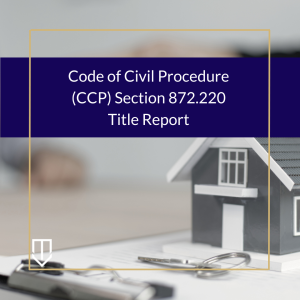 A property’s legal description is an essential element of any property transfer, and it serves as the basis for most property-based lawsuits. Quiet title summons, partition complaints, and lis pendens notices must all contain legal descriptions, just to name a few.
A property’s legal description is an essential element of any property transfer, and it serves as the basis for most property-based lawsuits. Quiet title summons, partition complaints, and lis pendens notices must all contain legal descriptions, just to name a few.
Funnily enough, however, despite the legal description importance, there is no standard form in use. It can be a property’s address (if it has one), a metes and bounds description, or (commonly), it can reference a county’s official map.
But what is not sufficient, at least by itself, is a property’s assessor parcel number (APN). This is because an APN is a number assigned to a parcel map to designate property or groups of properties as being subject to certain taxes. The county assessor isn’t concerned with assigning numbers to correctly measure the physical size of the lot. Instead, an assessor may combine properties or cut them in half for taxation purposes.
 The California Partition Law begins at Code of Civil Procedure section 872.010 and ends at Code of Civil Procedure section 874.323. Section 872.220 requires that the plaintiff state the existence and location of a title report if they have procured one. A title report includes a preliminary report, guarantee, binder, or policy of title insurance. (CCP § 872.010 subd. (e).)
The California Partition Law begins at Code of Civil Procedure section 872.010 and ends at Code of Civil Procedure section 874.323. Section 872.220 requires that the plaintiff state the existence and location of a title report if they have procured one. A title report includes a preliminary report, guarantee, binder, or policy of title insurance. (CCP § 872.010 subd. (e).) California Partition Law Blog
California Partition Law Blog


 There are two common ways an individual can own property: (1) as a tenant in common or (2) as a joint tenant. In California, there is a presumption that the co-owners of a piece of property are tenants in common unless the deed expressly states that the co-owners are joint tenants.
There are two common ways an individual can own property: (1) as a tenant in common or (2) as a joint tenant. In California, there is a presumption that the co-owners of a piece of property are tenants in common unless the deed expressly states that the co-owners are joint tenants.  “A trust is any arrangement which exists whereby property is transferred with an intention that it be held and administered by the transferee for the benefit of another.” (
“A trust is any arrangement which exists whereby property is transferred with an intention that it be held and administered by the transferee for the benefit of another.” ( Generally, a co-owner of real property may commence an action in a partition. Owners of an estate of inheritance, a life estate, or an estate for years who hold such interest concurrently or in successive estates may seek to
Generally, a co-owner of real property may commence an action in a partition. Owners of an estate of inheritance, a life estate, or an estate for years who hold such interest concurrently or in successive estates may seek to  A deed is a legal instrument, evidenced in writing, to confirm the ownership interest or legal rights of an owner of real property. Essentially, a deed is necessary to determine the titleholder of a piece of real estate. Moreover, a deed grants an owner of real property legal rights to convey, sell, or transfer the property. Therefore, when purchasing a piece of real property, it is extremely important for a person to obtain a deed in order to evidence their ownership in writing and protect their legal rights in the property.
A deed is a legal instrument, evidenced in writing, to confirm the ownership interest or legal rights of an owner of real property. Essentially, a deed is necessary to determine the titleholder of a piece of real estate. Moreover, a deed grants an owner of real property legal rights to convey, sell, or transfer the property. Therefore, when purchasing a piece of real property, it is extremely important for a person to obtain a deed in order to evidence their ownership in writing and protect their legal rights in the property.  A property’s legal description is an essential element of any property transfer, and it serves as the basis for most property-based lawsuits.
A property’s legal description is an essential element of any property transfer, and it serves as the basis for most property-based lawsuits.  An estate is categorized by the duration of time one holds an interest in the estate. For example, an estate acquired through inheritance is categorized differently from an estate for years. There are three different ways an estate can be categorized, which is codified in California Civil Code section 765. Essentially, section 765 categorizes an estate based on the character of the property.
An estate is categorized by the duration of time one holds an interest in the estate. For example, an estate acquired through inheritance is categorized differently from an estate for years. There are three different ways an estate can be categorized, which is codified in California Civil Code section 765. Essentially, section 765 categorizes an estate based on the character of the property.  While it may not be obvious, a sizeable portion of the work that real estate agents and realtors do is court-ordered. Real estate law is a massive field, and often, the disposition of litigation results in the court forcing the sale of a property, be it a business, home, condominium, etc. As such, many realtors find themselves acting as agents or referees for parties to a lawsuit.
While it may not be obvious, a sizeable portion of the work that real estate agents and realtors do is court-ordered. Real estate law is a massive field, and often, the disposition of litigation results in the court forcing the sale of a property, be it a business, home, condominium, etc. As such, many realtors find themselves acting as agents or referees for parties to a lawsuit.  In California, a real estate investment trust is “any unincorporated association or trust formed to engage in business and managed by, or under the direction of, one or more trustees for the benefit of the holders or owners of transferable shares of beneficial interest in the trust estate and (1) that formed for the purpose of engaging in business as a real estate investment trust under the Federal Internal Revenue Code, (2) the sale of the shares of which has been qualified at any time by the Commissioner of Business Oversight pursuant to the Corporate Securities Law of 1968, and (3) that in good faith has commenced business as a real estate investment trust.” (Cal. Corp. Code
In California, a real estate investment trust is “any unincorporated association or trust formed to engage in business and managed by, or under the direction of, one or more trustees for the benefit of the holders or owners of transferable shares of beneficial interest in the trust estate and (1) that formed for the purpose of engaging in business as a real estate investment trust under the Federal Internal Revenue Code, (2) the sale of the shares of which has been qualified at any time by the Commissioner of Business Oversight pursuant to the Corporate Securities Law of 1968, and (3) that in good faith has commenced business as a real estate investment trust.” (Cal. Corp. Code  When a loved one passes away, probate proceedings are hopefully not the first thing on their relatives’ minds. Probate is, however, an inevitability, even when a trust is present and effective. But inheritance is not always the blessing that the public conscious imagines it to be. The simple truth is that owning property in California is an expensive endeavor that carries with it tons of monetary responsibility. Faced with the possibility of inheriting something an individual simply cannot afford, there is an option: a disclaimer of interest.
When a loved one passes away, probate proceedings are hopefully not the first thing on their relatives’ minds. Probate is, however, an inevitability, even when a trust is present and effective. But inheritance is not always the blessing that the public conscious imagines it to be. The simple truth is that owning property in California is an expensive endeavor that carries with it tons of monetary responsibility. Faced with the possibility of inheriting something an individual simply cannot afford, there is an option: a disclaimer of interest.